Conference on Kurdish cause held in Moscow
Moreover, history scholars from countries, including Austria, the Netherlands, Sweden, Belarus, and other Russian cities participated online.

ERBIL (Kurdistan 24) – The third conference about the Kurdish issue was held on Wednesday at the Moscow Institute of Oriental Studies under the title “Lazarev’s Analysis,” in which scholars presented 20 articles and scientific research on the ethnic group.
Mikhail Simonovich Lazarev was a well-known Kurdish scholar of the former Soviet Union and a member of the Kurdish Department of the Soviet University of Oriental Studies. Lazarev was an expert on the history of Kurdish liberation movements throughout the 20th Century.
Moreover, history scholars from countries, including Austria, the Netherlands, Sweden, Belarus, and other Russian cities participated online.
Vyacheslav Yakovlevich, the head of the institute, stated that the Kurdish issue has a deep history, so it takes time to resolve it quickly.
"The Kurdish issue can be resolved at three levels: the international level, the regional level, and the local level,” Yakovlevich noted.
Meanwhile, Kirill Vertyaev, Director of the Department of Kurdish Studies at the Institute of Oriental Studies, Russian Academy of Science told Kurdistan 24 that “the results of this conference are useful in broadly understanding relations between countries.”
"Here we can understand Russian policy towards the Kurds, and we can also understand whether the direction of Russian policy is in line with the concerns of the Kurds,” Vertyaev added.
Historically, Russia, under the Soviet Union, had an indifferent relationship with the Kurds, such as its initial support for the Republic of Mahabad, yet later withdrawing said support in 1946, leading to the state’s swift demise at the hands of the Shah.
The Soviets had frequently shifted their support for the Kurdish liberation movement, led by Mustafa Barzani. They hosted the separatists after Mahabad's collapse in 1947, yet later, the Soviets largely refused to get involved when the Ba'athist regime's campaigns against the Kurds began in the 1970s.
Today, that indifferent approach largely remains, where in Syria, the Russians have neither supported or attacked the Kurdish-led Syrian Democratic Forces (SDF), who are supported by Russia's arch-nemesis, the United States.
There, Russia's main goal is to oversee the demise of ISIS and to bolster the regime of President Bashar al-Assad, a campaign that the Kurds have indirectly aided in their coincidental fight against the same terror group, albeit under the auspices of the United States.
Additional reporting by Kurdistan 24 correspondent Khoshawi Mohammed
